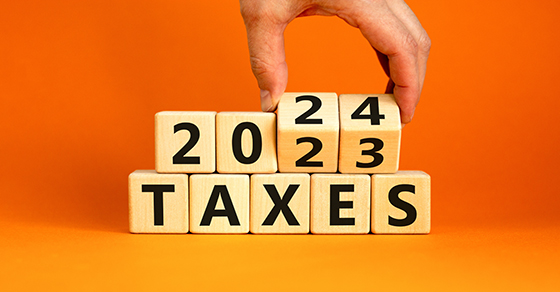Navigating the tax landscape requires a keen understanding of the 2024 inflation-adjusted figures, especially for individuals. The standard deduction, a fundamental element for those who don't itemize, sees notable increases.
Additional allowances apply for older taxpayers and the visually impaired.

Furthermore, this article delves into key thresholds for ordinary income, short-term capital gains, long-term capital gains, and qualified dividends. It also addresses aspects of gift and estate tax, offering a comprehensive guide to the critical inflation-adjusted tax amounts shaping the financial landscape for individuals in the upcoming year. Most of the federal income tax rate bracket thresholds are about 5.4% higher than for 2023. That means that you can generally have about 5.4% more income next year without owing more to the federal government.
Standard deduction
Here are the inflation-adjusted standard deduction numbers for 2024 for those who don’t itemize:
- $14,600 if you’re single or use married filing separate status (up from $13,850 in 2023).
- $29,200 if you’re married and file jointly (up from $27,700).
- $21,900 if you’re a head of household (up from $20,800).
Older taxpayers and those who are blind are entitled to additional standard deduction allowances. In 2024 for those age 65 or older or blind, the amounts will be: $1,550 for a married taxpayer (up from $1,500 in 2023) and $1,950 for a single filer or head of household (up from $1,850 for 2023).
For an individual who can be claimed as a dependent on another taxpayer’s return, the 2024 standard deduction will be the greater of: 1) $1,300 (up from $1,250 for 2023) or 2) $450 (up from $400 for 2023) plus the individual’s earned income, not to exceed $14,600 (up from $13,850 for 2023).
Ordinary income and short-term capital gains
Here are the 2024 inflation-adjusted bracket thresholds for ordinary income and net short-term capital gains:
- 10% tax bracket: $0 to $11,600 for singles, $0 to $23,200 for married joint filers, $0 to $16,550 for heads of household;
- Beginning of 12% bracket: $11,601 for singles, $23,201 for married joint filers, $16,551 for heads of household;
- Beginning of 22% bracket: $47,151 for singles, $94,301 for married joint filers, $63,101 for heads of household;
- Beginning of 24% bracket: $100,526 for singles, $201,051 for married joint filers, $100,501 for heads of household;
- Beginning of 32% bracket: $191,951 for singles, $383,901 for married joint filers, $191,951 for heads of household;
- Beginning of 35% bracket: $243,726 for singles, $487,451 for married joint filers and $243,701 for heads of household; and
- Beginning of 37% bracket: $609,351 for singles, $731,201 for married joint filers and $609,351 for heads of household.
Long-term capital gains and dividends
Here are the 2024 inflation-adjusted bracket thresholds for net long-term capital gains and qualified dividends:
- 0% tax bracket: $0 to $47,025 for singles, $0 to $94,050 for married joint filers, and $0 to $63,000 for heads of household;
- Beginning of 15% bracket: $47,026 for singles, $94,051 for married joint filers, and $63,001 for heads of household; and
- Beginning of 20% bracket: $518,901 for singles, $583,751 for married joint filers and $551,351 for heads of household.
Gift and estate tax
The annual exclusion for gifts made in 2024 will be $18,000 (up from $17,000 for 2023). That means you can give away up to $18,000 to as many individuals as you wish without incurring gift tax or using up any of your unified federal gift and estate tax exemption.
In 2024, the unified federal gift and estate tax exemption will be $13,610,000 (up from $12,920,000 for 2023).
For gifts made in 2024, the annual exclusion for gifts to a noncitizen spouse will be $185,000 (up from $175,000 in 2023).
Conclusion
This article only covers some of the inflation-adjusted tax amounts. There are others that may potentially apply, including: alternative minimum tax parameters, kiddie tax amounts, limits on the refundable amount of the Child Tax Credit, limits on the adoption credit, IRA contribution amounts, contributions to your company’s retirement plan and health savings account amounts. Various other inflation-adjusted amounts may affect your tax situation if you own an interest in a sole proprietorship or a pass-through business. If you own interest in a sole proprietorship or a pass-through business please take a look at our Small Business Tax article “Crucial 2024 Tax Guidelines for Small Businesses and Their Owners, Accounting for Inflation. If you have any questions, please contact your Rudler, PSC advisor at 859-331-1717.
RUDLER, PSC CPAs and Business Advisors
This week's Rudler Review is presented by Joshua Myers, Staff Accountant and Rebecca Thorman, CPA, CVA.
If you would like to discuss your particular situation, contact Josh or Becca at 859-331-1717.


As part of Rudler, PSC's commitment to true proactive client partnerships, we have encouraged our professionals to specialize in their areas of interest, providing clients with specialized knowledge and strategic relationships. Be sure to receive future Rudler Reviews for advice from our experts, sign up today !